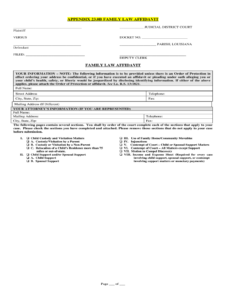What is an Affidavit in Law?
admin
- 0
Affidavit in Law
An affidavit is a written statement made by someone in the legal system to support a statement made orally. It must be true, and contain all of the facts that the affiant has personal knowledge of. It cannot be a statement made based on speculation or inference. Furthermore, an affidavit cannot be made for someone else, since the person making the affidavit must be authorised to do so.
There are many uses for affidavits in the law. They are often used by lawyers in court filings, and their form can vary depending on what the attorney wants. However, many affidavits follow the same general format, and can be customized as needed. Whether the document is used for personal or legal purposes, the information should be accurate and complete. A well-written affidavit will reduce the chances of impediment in the courtroom.
Affidavits can be required or voluntary in legal proceedings, and in some circumstances, they are even required. These documents serve as a substitute for sworn testimony and are used in divorce proceedings, property disputes, and debt cases. Aside from legal purposes, what is an affidavit are also often used in court proceedings, ranging from a simple statement to a formal declaration.
In court, an affidavit is a written statement of facts by an individual under penalty of perjury. It is not intended to be long or complex, but it should be factual and objective. Besides, it should contain a single fact per paragraph. The final line of an affidavit should end with “Further Affiant Sayeth Naught.”

What is an Affidavit in Law?
When writing an affidavit, remember that it should not contain any errors or negative language. It should also be short, concise, and free of grammatical errors. It must also be signed in the presence of a notary public, so that it can be legally accepted by the court. When affidavits are filed in court, they can speak volumes for the credibility of the person making them.
Unlike depositions, affidavits cannot be cross-examined, but serve as proof of certain facts. They can be used to prove a particular fact and are only admissible when better evidence cannot be offered. For example, if a witness is unavailable, the affidavit can be used to impeach their testimony and provide proof of their past recollection.
When an affidavit is used in court, it is crucial to follow the stipulations laid down by the judge or arbitrator. An affidavit can include provisions regarding untruths and consequences. If an affidavit does not contain any of these provisions, then the document is not legally valid. Therefore, it is crucial to read all relevant laws to ensure that you understand what an affidavit means.
Affidavits are often legally valid as long as they are signed and witnessed by a notary. If the document contains inaccurate information, it is not accepted. However, if you are unsure about the requirements, you can always contact a lawyer who can help you. There are many websites online that offer affidavit forms. If you need assistance, you should contact a lawyer who specializes in your field.
